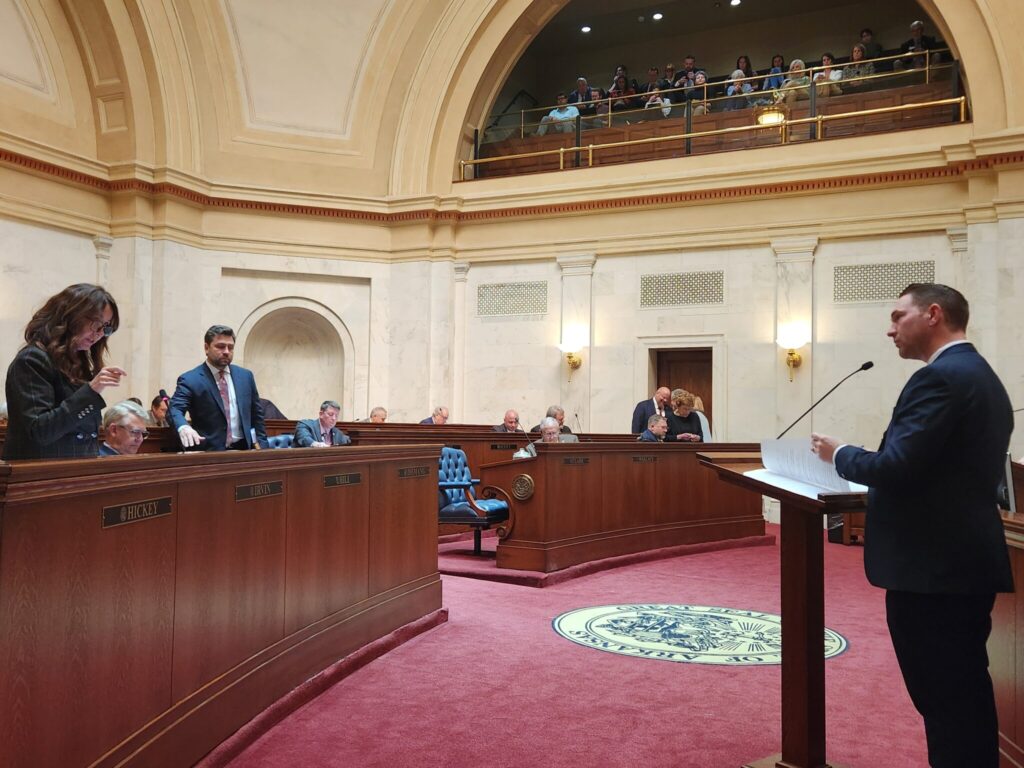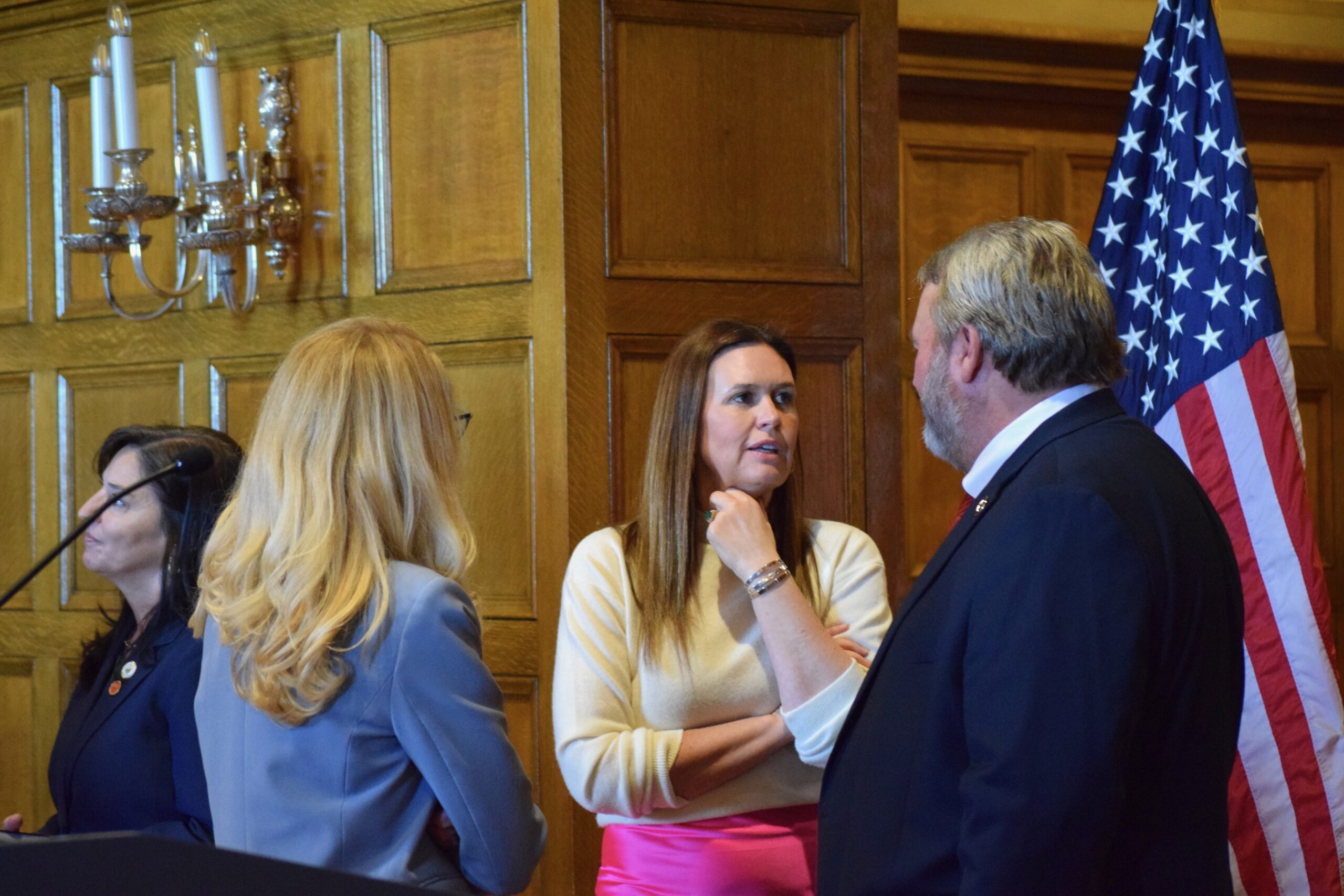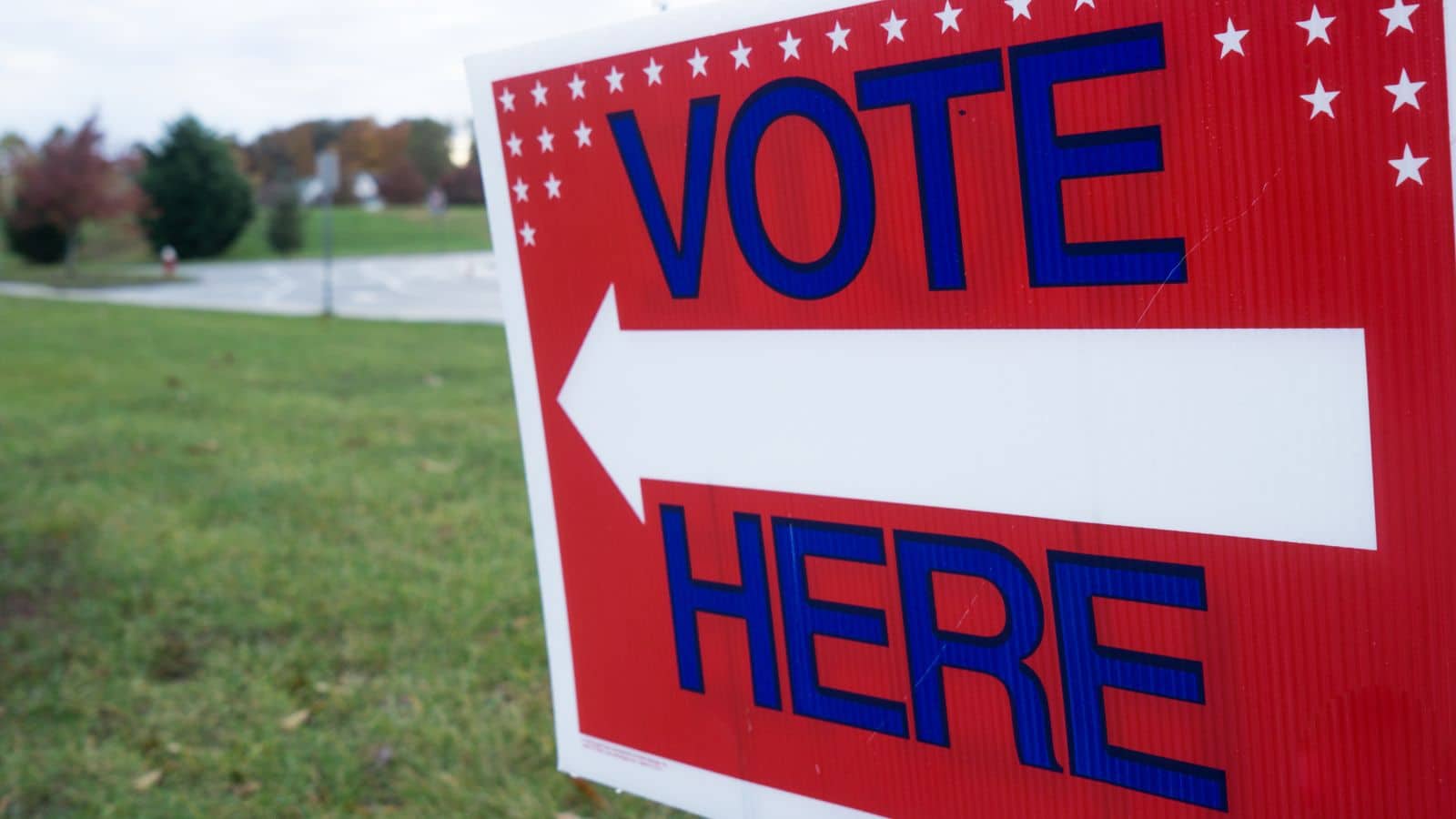by Antoinette Grajeda, Tess Vrbin, Ainsley Platt and Sonny Albarado, Arkansas Advocate
April 18, 2025
With one major exception, Arkansas lawmakers gave Gov. Sarah Huckabee Sanders almost everything she asked for in the 95th General Assembly, and even then it wasn’t a total loss.
The Legislature’s Republican supermajority passed bills addressing Sanders’ priorities: maternal health, a higher-education overhaul, concerns about the effects of social media platforms on children and restrictions on the influence of China in Arkansas.
The big exception: funding for a planned 3,000-bed prison in rural Franklin County on the western side of the state.
Senate Minority Leader Greg Leding, D-Fayetteville, told the Advocate Wednesday that he’s experienced longer and more challenging sessions since being elected to the state Legislature in 2010, but the 2025 session saw “quite a lot of conflict.”
Much of the controversy arose over efforts by one legislator to dissolve the State Library and its board and another lawmaker’s efforts to police the use of public restrooms. Then there was a conflict about funding a new state prison.
“The biggest story is probably the defeat of the appropriation for the prison in Franklin County, especially considering that was one of the governor’s top priorities,” Leding said.
A $750 million appropriation bill to support the prison’s construction died after five failed votes in the Senate this month. Sanders has pushed for the new penitentiary to alleviate overcrowding in county jails. State officials and residents have fought against the project, citing concerns about transparency, infrastructure and staffing.
State lawmakers this week also challenged a separate bill that would have added $250 million to a correctional facilities set-aside fund into which the Legislature placed $330 million during the 2023 legislative session.
An additional $75 million appropriated in 2022 for prison expansion has already been allocated to the Arkansas Department of Corrections, which can use the funding to move the project forward.
Senate President Pro Tempore Bart Hester, R-Cave Springs, said Wednesday that money will support the hiring of architects and engineers who can help officials get a better understanding of the project’s overall cost. Initial estimates set the prison’s price tag at $825 million. The state Board of Corrections has already sought proposals from architects and general contractors.
“I would have liked to have funded the entire prison, but the members saw fit to just fund a portion of it, and that’s great,” Hester said. “We’re moving in the direction we want to go, just not as fast as we wanted to go.”
Putting a more positive spin on the rejection of the $750 million appropriation bill, its primary sponsor, Searcy Republican Sen. Jonathan Dismang, told the Joint Budget Committee Monday that the corrections department isn’t likely to use all $75 million allocated to the agency before next year’s fiscal session — when lawmakers can again explore options for funding prison expansion in April. If officials need more money before then, they can request lawmakers’ approval for a temporary appropriation increase, he said.
Maternal health

Sanders’ effort to address the state’s poor maternal health outcomes found bipartisan support this session and culminated with her signing Act 124 into law just two weeks after announcing the policy.
The Healthy Moms, Healthy Babies Act changes the state’s Medicaid program by establishing presumptive Medicaid eligibility for pregnant Arkansans, offering reimbursements for doulas and community health workers and establishing pregnancy-related Medicaid coverage for specific treatments. Gov. Sarah Huckabee Sanders announces the “Healthy Moms, Healthy Babies Act,” which intends to reduce Arkansas’ high maternal mortality rate. Republican legislators and cosponsors of the proposed legislation, Sen. Missy Irvin of Mountain View and Rep. Aaron Pilkington of Knoxville, are at right during a press conference at the state Capitol on Feb. 6, 2025. (Mary Hennigan/Arkansas Advocate)
Arkansas has one of the highest maternal mortality rates in the nation, and the third-highest infant mortality rate, according to the Arkansas Center for Health Improvement.
Sanders last year convened a Strategic Committee for Maternal Health to develop recommendations for addressing the state’s maternal health crisis. Sanders’ efforts have not included support for expanding Medicaid coverage for postpartum mothers from 60 days to 12 months after birth because she said it would be “duplicative.” Arkansas is the only state that has not taken advantage of this federal option.
Rep. Aaron Pilkington, R-Knoxville, and Sen. Breanne Davis, R-Russellville, presented legislation this session that would have provided the extended coverage to qualifying pregnant Arkansans. House Bill 1004 advanced through the House before failing in a Senate committee earlier this month.
Arkansas’ Medicaid expansion program, called ARHOME, covers people up to 138% of the federal poverty level. ARHOME covered 237,327 Arkansans as of the end of February, the latest figures available from the Department of Human Services. Regular Medicaid and the Children’s Health Insurance Program covered another 230,058 adults and 421,192 children, for a total of 888,577 Medicaid beneficiaries.
Since Jan. 1, 2023, Medicaid covers pregnant Arkansans with incomes of up to 214% of the federal poverty level, or about $45,200 for a family of two or $68,700 for a family of four.
This coverage expires two months after birth, leaving many postpartum Arkansans to “fall through the cracks,” Davis told the Senate Public Health, Welfare and Labor Committee on April 9.
“We have got to address this holistically, and I think there’s been a lot of really good work done, but it has not included this group of women,” who do not qualify for Medicaid expansion, she said.
The proposal to expand coverage had supporters from both political parties. House Minority Leader Rep. Andrew Collins, D-Little Rock, proposed a similar bill that was never heard in committee.
Social media
Sanders signed two bills Wednesday that she said in January’s State of the State address she hoped would reach her desk during the session.
The two bills cleared the Legislature on the last two days of business. One new law allows parents to file civil lawsuits against social media platforms if content on those platforms harms their children, and the other amends the state’s blocked social media age verification law.

The Social Media Safety Act of 2023 was the first of its kind in the nation and required social media platforms to verify the age of new account holders in Arkansas. Those under 18 could only access sites with parental permission. A federal judge temporarily blocked the law before it went into effect and permanently blocked it in March.
The amendments to the Social Media Safety Act will go into effect in August. They more clearly define social media and apply the definition to more platforms, lower the age of minor users from under 18 to under 16 years old, prohibit social media algorithms from targeting minors, and add a penalty for noncompliance. Sen. Missy Irvin (left), R-Mountain View, asks a question about Senate Bill 611, sponsored by Sen. Tyler Dees (right), R-Siloam Springs, on the Senate floor on Monday, April 7, 2025. (Tess Vrbin/Arkansas Advocate)
The other bill Sanders signed would hold social media companies accountable for showing and promoting content to a child without that child’s consent if viewing the content leads to “significant bodily or cognitive harm.”
Sanders has yet to take action on a third social media regulation bill on her desk, the Children and Teens’ Online Privacy Protection Act. That bill would ban technology companies from collecting data from Arkansas minors except under specific circumstances, such as for financial transactions.
Companies would also be barred from retaining that data and disclosing it to third parties that use the information in advertising targeted to children, and they would be required to provide notice and obtain consent if they are collecting data under permissible circumstances.
Ballot measures
Sanders signed a slew of bills that place new restrictions on direct democracy, the process by which Arkansans can propose new laws or constitutional amendments and put them to a statewide vote. Many were sponsored by Sen. Kim Hammer, R-Benton, who in 2026 will run for Secretary of State, the office that oversees elections.
Hammer and other Republican lawmakers said adding regulations to the process of soliciting and gathering signatures on petitions will protect the integrity of direct democracy and discourage fraudulent behavior.
New requirements include but are not limited to:
- Signature gatherers, known as canvassers, must inform potential signers that petition fraud is a criminal offense
- Canvassers must request a photo ID from potential signers
- Potential signers must read a petition’s ballot title or have it read to them
- Ballot titles must be at an eighth-grade reading level or lower
- Petition sponsors cannot submit more than one conflicting petition at the same time
Democratic lawmakers and members of the public said the restrictions will have a chilling effect on the people’s right to initiate new laws and constitutional amendments.
In February, a committee rejected a proposed enforcement agency within the Secretary of State’s office to investigate the validity of submitted ballot initiative documents.
On Wednesday, the final day of the session, the House voted down a bill that would have given the Legislature the authority to overturn voter-approved constitutional amendments.
The Red Menace
The Legislature also took up multiple “foreign adversary” bills. While the bills technically targeted several nations — such as Iran, Russia and North Korea — China has been repeatedly mentioned by lawmakers intent on rooting out the Communist country’s perceived influence within Arkansas.
Sanders promoted the legislation, saying in press conferences and on social media that Arkansas is the first state to “kick China off of our farmland and out of our state.”

The session’s efforts built off of legislation passed in 2023 and 2024 that limited Chinese businesses from owning land in Arkansas and prohibited them from operating cryptocurrency mining facilities.
Many of the bills passed in the last days of the session, such as House Bill 1680, which built on Act 636 of 2023’s prohibition against land ownership by foreign adversary-controlled businesses. HB1680 added more prohibitions on such businesses, banning them from holding leases on land or having an interest in agricultural land within 10 miles of “critical infrastructure” such as dams or power generation facilities.
Other foreign adversary bills targeted higher education. Act 473 of 2025 requires extensive screening of individuals being considered for employment by a university or college if the person is from a covered foreign adversary such as China, depending on the role they are being considered for. It also creates a high bar for higher education institutions to enter into research agreements or cultural exchanges with groups from foreign adversary nations, requiring they be rejected unless a strong state interest is identified.
Another bill, House Bill 1352, prohibits funding for institutions of higher education that have a Chinese cultural center or a Confucius Institute. A federal government report in October 2023 noted there are fewer than five Confucius Institutes left in the U.S. since Congress restricted federal funding to schools with institutes.
Under House Bill 1604, government agencies would be prohibited from buying promotional items such as stickers and mugs from Chinese businesses, while House Bill 1683 would bar government agencies from buying electric vehicles or their components if the vendor could not certify that it was not made using forced labor.
HB1683 took particular aim at alleged forced-labor practices in China — specifically mentioning alleged human rights abuses committed against the Uyghur people — although the importation of goods made with forced labor has been illegal in the U.S. since 1930 with the passage of the Smoot-Hawley Tariff Act.
The Uyghur Forced Labor Prevention Act of 2021 established that there is a presumption that all goods imported from China’s Xinjiang region, where allegations of forced labor are concentrated, are produced using forced labor.
Arkansas Advocate is part of States Newsroom, a nonprofit news network supported by grants and a coalition of donors as a 501c(3) public charity. Arkansas Advocate maintains editorial independence. Contact Editor Sonny Albarado for questions: info@arkansasadvocate.com.



